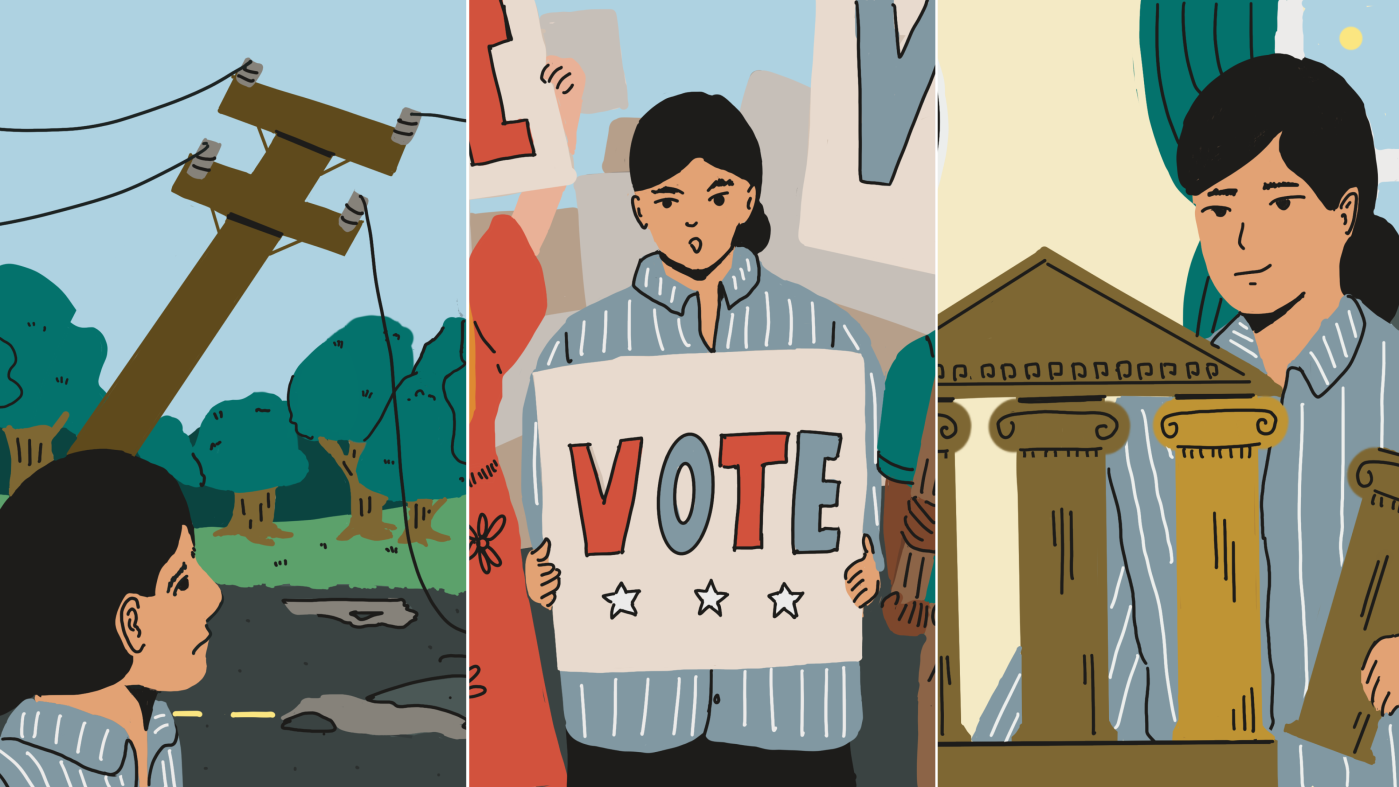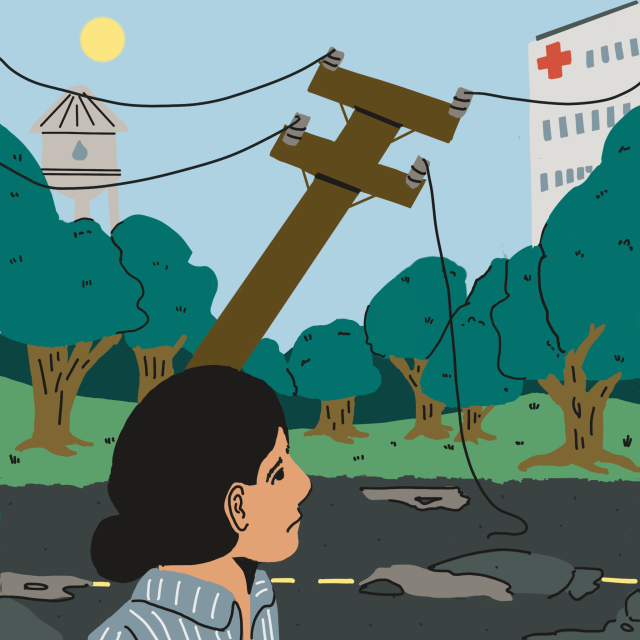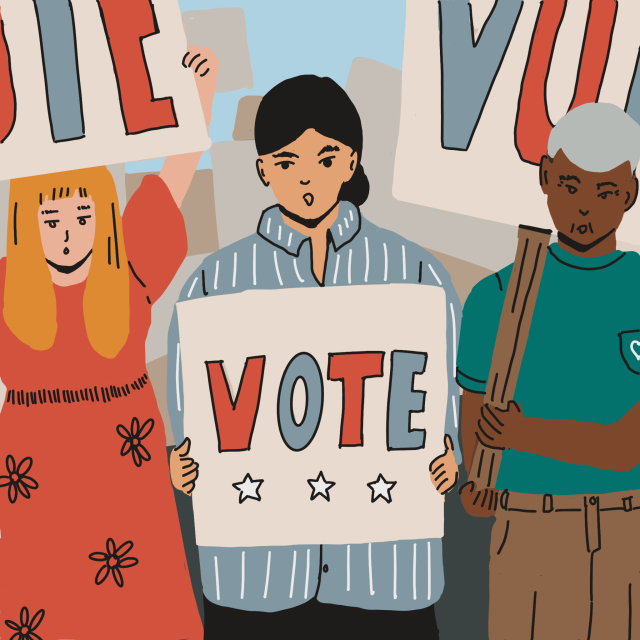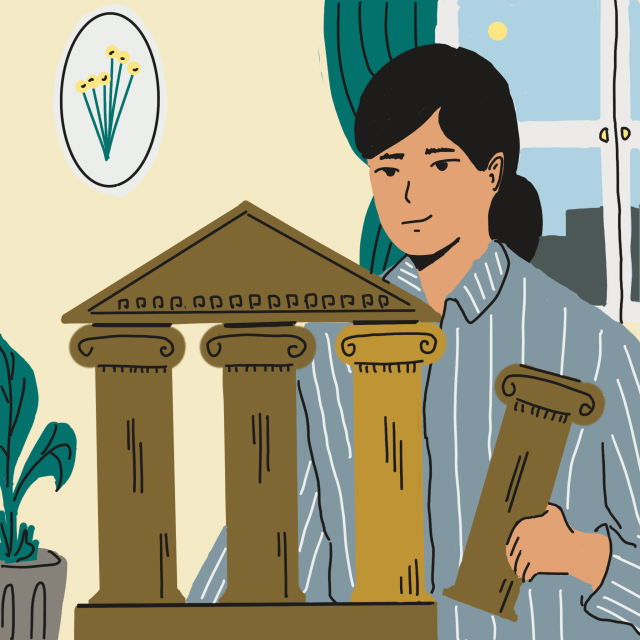How People in 24 Countries Think Democracy Can Improve
Illustrations by John Carlo Mandapat

Dissatisfaction with democracy is high and, in many places, rising. But how do people think democracy in their country could be improved? To answer this, Pew Research Center asked over 30,000 people in 24 countries what they think would help make democracy work better where they live.
Three key themes emerged:

Addressing basic needs. People highlight problems with their country’s economy, the need for jobs, a desire for safety and security, and problems with roads, electricity, health care and more – pointing to the precursors to democracy, or the things they need in order for it to function at all.

Improving the system. People also want to improve parts of the government they already have. They want better politicians or fairer implementation of existing rights. And many call for their country’s citizens to participate more or behave differently in other ways.

Overhauling the system. Some feel like the system itself needs to be reformed through changes to the electoral process, the balance of power between institutions, or the structure of courts, among other suggestions.
Jump to our quote collection to read how people want to improve their democracy in their own words.
For a deeper dive into the 17 types of changes people suggest, read “What Can Improve Democracy?”

Addressing basic needs
For some, there is a sense that good democracy is based on their needs being met – and this is particularly true in the middle-income countries we surveyed. For example, one woman in Indonesia emphasized the need to “improve economic conditions to ensure democracy goes well.” Others highlight jobs, managing inflation, caring for the poor, livable wages, union reform and more.
Infrastructure is also a key focus. One man in Nigeria noted, “When education, roads, hospitals and adequate water are made available then I can say democracy will improve.” In South Africa, amid months of rolling blackouts, one woman said, “The government must support the nation with service delivery. We poor people don’t get any benefits. Electricity must be solved.”
In India, agricultural policies also command attention – both prioritizing agriculture and implementing specific policy changes, like decreasing seed prices or reducing farmers’ loans.
And some people emphasize the need for the state to reduce crime and increase safety, especially for women. One woman in Mexico suggested her government “pay more attention to what they need to: supporting women who suffer violence, rape or mistreatment.”

“They should just work to reduce crime and get us jobs and houses because that is what we are voting for.”
Economic reform, Policies and legislation, Safety
– Man, 18, South Africa
“Change the economic system in Indonesia first so people will get welfare. Then the democratic system will go well.”
Economic reform
– Woman, 41, Indonesia

Improving the system
Fixing democracy for many respondents comes down to improving politicians, changing citizen behavior and ensuring the fair implementation of laws. In most countries, getting different or better politicians – whether they be more representative of the population, more competent or more responsive – is the most commonly requested change. One Australian woman called for “more younger politicians and those who are from working-class communities and realistic in understanding how the less wealthy live.” A Kenyan woman said democracy would improve if “leaders listen to Kenyans’ opinions and put the country’s well-being ahead of their own.”
Some highlight how citizens themselves can change. This includes general calls for kindness, unity and respect, and appeals to end specific social conflicts – as in the case of one Israeli man who called for understanding “between religious and secular people.” Others see the need for the people to do more: vote at higher rates; educate themselves, especially in civics; and even protest at key moments.
Some focus on fairer implementation of existing laws and rights. For example, a number of people broadly call for leaders to “follow the Constitution,” while others stress not allowing leaders charged with crimes to run for office. Treating everyone equally – both in general and in terms of specific ethnic, racial or religious groups – is also a dominant theme in some countries. One French woman proposed “more equality between men and women, better integration of immigrants, eradication of poverty, and elimination of child and animal abuse” as means to improve democracy.

“Increased participation of the population in politics. Education for people, because knowledgeable people know how to deal with different opinions.”
Citizens, Policies and legislation
– Woman, 31, Brazil
“This country is full of idiots. Let’s have some real people in politics instead of these toffee-nosed public school boys. I know it’s a generalization, but it sort of sums it up. Why can’t we have some specialists, some real people to advise? Not those handpicked from the aristocratic elite.”
Politicians
– Woman, 54, UK

Overhauling the system
For some, fundamental changes are needed to improve democracy. These can be very country-specific changes, like abolishing the House of Lords in the United Kingdom, changing the power of autonomous regions in Spain or revising Article 49.3 in France. Others focus on the need to change the size of certain institutions (such as the legislature), balance power between branches or levels of government, or impose stricter term limits.
Reforming the judicial system, whether by replacing the judges on the Constitutional Tribunal in Poland, changing how judges are appointed in Spain or adding term limits to the U.S. Supreme Court, is also a priority. In Israel, where the survey was conducted during a wave of protests against judicial reform (and prior to the Oct. 7 Hamas attack), calls to “weaken the High Court of Justice because it’s harmful to democracy” as well as preserve the court’s independence were the most commonly suggested democratic improvement.
The way elections are conducted is also a concern, with many proposing a switch to proportional representation, or the implementation of ranked choice voting or first-past-the-post elections. Country-specific issues such as eliminating the Electoral College in the United States, abolishing the D’hondt method in Spain or raising the electoral threshold in the Netherlands were also suggested as improvements to democracy.
There are also broader calls for more elections – especially referenda or ballot initiatives. Sometimes, people called for votes on specific issues, as one woman in Sweden did: “More referenda on nuclear power, sexuality, NATO and the EU.” Other times, people simply wanted the public to have a more direct say in policymaking, as in the case of one Australian man who said, “Direct democracy. Allow the citizens to vote on the important policy directions the country makes.”

“Changing the electoral law with the possibility of directly electing deputies and senators. It should not be as it is now, that they are assigned by the parties. We should give more leeway to the prime minister.”
Electoral reform
– Man, 78, Italy
“Bring more issues to the general public for voting instead of letting the current representatives vote on them. More referendum-style voting on various issues.”
Direct democracy
– Woman, 34, Canada
In their own words
Below, we have a selection of quotes that describe what people think should be changed in their country to make democracy function better. You can explore the quotes by country or by topic. Quotes are also available in their original language for select languages.
Filter by country